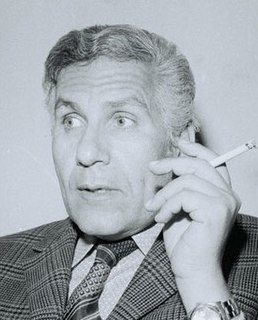A Quote by Vladimir Nabokov
Dostoevky's lack of taste, his monotonous dealings with persons suffering with pre-Freudian complexes, the way he has of wallowing in the tragic misadventures of human dignity - all this is difficult to admire.
Related Quotes
The way in which a man accepts his fate and all the suffering it entails, the way in which he takes up his cross, gives him ample opportunity — even under the most difficult circumstances — to add a deeper meaning to his life. It may remain brave, dignified and unselfish. Or in the bitter fight for self preservation he may forget his human dignity and become no more than an animal
Suffering, if you're a Christian, suffering is a part of life. And it's not a bad thing, it is an essential thing in life... There are all different ways to suffer. One way to suffer is through lack of food and shelter and there's another way to suffer which is lack of dignity and hope and there's all sorts of ways that people suffer and it's not just tangible, it's also intangible and we have to consider both.
To persuade thinking persons in Eastern Europe that Central American Marxists - the Sandinistas, the guerillas in El Salvador - are in absurd and tragic error is not difficult. Poles and Czechs and Hungarians can hardly believe, after what they experienced under socialism, that other human beings would fall for the same bundle of lies, half-truths, and distortions. Sadly, however, illusion is often sweeter to human taste than reality. The last marxist in the world will probably be an American nun.
But the dignity of human life is unbreakably linked to the existence of the personal-infinite God. It is because there is a personal-infinite God who has made men and women in His own image that they have a unique dignity of life as human beings. Human life then is filled with dignity, and the state and humanistically oriented law have no right and no authority to take human life arbitrarily in the way it is being taken.
This is our dilemma--either to taste and not to know or to know and not to taste--or, more strictly, to lack one kind of knowledge because we are in an experience or to lack another kind because we are outside it. [. . .] Of this tragic dilemma myth is the partial solution. In the enjoyment of a great myth we come nearest to experiencing as a concrete what can otherwise be understood only as an abstraction.
I want men to admire me, but that's a trick you learn at school--a movement of the eyes, a tone of voice, a touch of the hand on the shoulder or the head. If they think you admire them, they will admire you because of your good taste, and when they admire you, you have an illusion for a moment that there's something to admire.
My dad kept me away from people who treat children wrong. It's just amazing that there is such a way to raise a person without giving them complexes. But nobody does it. They think it should be the old school. But look at the products. Wouldn't it be great if you could avoid the complexes? Then you could deal with the complexes of life.
Not bodies produce sensations, but element-complexes (sensation-complexes) constitute the bodies. When the physicist considers the bodies as the permanent reality, the 'elements' as the transient appearance, he does not realise that all 'bodies' are only mental symbols for element-complexes (sensation-complexes).







































